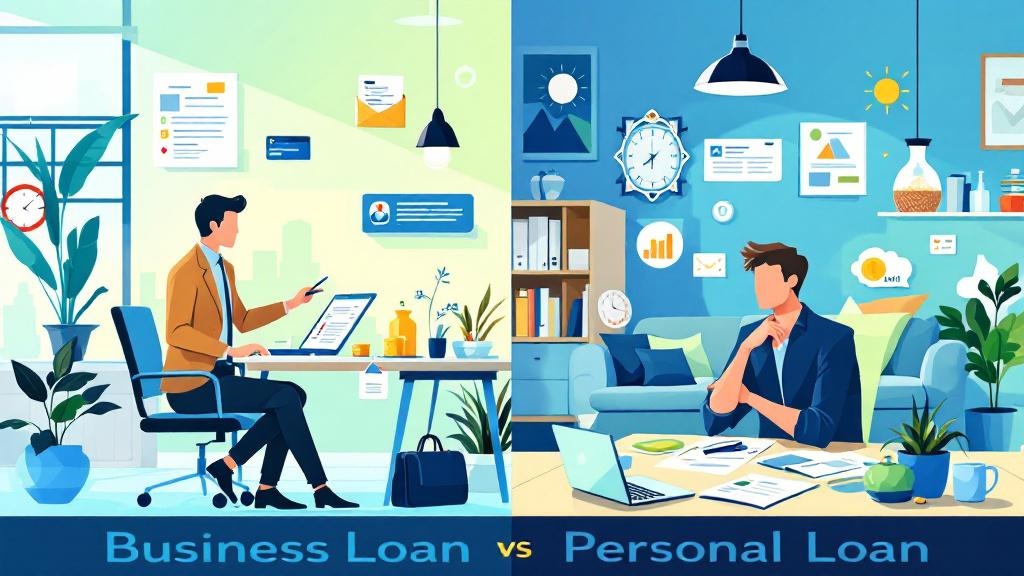When it comes to securing financing, many people are unsure whether to apply for a Company loan or a personal loan. Both offer distinct advantages, but knowing which one is best suited for your needs depends on various factors such as your financial goals, Company needs, and loan eligibility criteria. In this post, we will break down the key differences between Business Loan vs Personal Loan and help you make an informed decision about which type of loan is right for you.
Table of Contents
-
What Is a Business Loan?
-
What Is a Personal Loan?
-
Key Differences: Company Loan vs Personal Loan
-
-
Loan Purpose
-
-
-
Eligibility Criteria
-
-
-
Loan Repayment Terms
-
-
-
Interest Rates and Fees
-
-
-
Loan Amounts
-
-
-
When Should You Choose a Company Loan?
-
When Should You Choose a Personal Loan?
-
FAQs about Company Loans vs Personal Loans
What Is a Business Loan?
A Company loan is a financial product designed specifically for Company owners. It’s intended to help fund the growth, expansion, and operational costs of your Company. Whether you’re starting a new venture or looking to scale your existing Company, a business loan can provide the capital necessary for activities like purchasing equipment, expanding inventory, hiring staff, or even funding marketing efforts.
In India, Company loans are typically offered by banks, non-banking financial companies (NBFCs), and government schemes for entrepreneurs. The eligibility criteria for Company loans can vary, but in general, they require the borrower to have a registered Company , good credit history, and proven Company performance.
Key Features of Business Loans:
-
Purpose: Company -related expenses (e.g., working capital, purchasing assets, expanding operations)
-
Loan Terms: Varies from a few months to several years
-
Interest Rates: Generally higher than personal loans but often offer more flexibility in repayment terms
What Is a Personal Loan?
A personal loan is a versatile financial product that can be used for virtually any personal need, including medical emergencies, vacations, home improvements, or debt consolidation. Unlike a Company loan, which is meant for Company purposes, a personal loan is typically unsecured, meaning it doesn’t require collateral.
In India, personal loans are easily accessible from banks and NBFCs. They usually have shorter repayment terms (up to 5 years) and can be approved quickly, making them ideal for urgent personal financial needs.
Key Features of Personal Loans:
-
Purpose: Personal use (e.g., weddings, home renovation, debt repayment)
-
Loan Terms: Generally shorter than Company loans, often up to 5 years
-
Interest Rates: Typically higher than Company loans due to the unsecured nature
Key Differences: Business Financing vs Personal Credit
Deciding between business financing and personal credit can be challenging. Both options have unique benefits, but knowing which is right for your needs depends on your financial goals, business requirements, and eligibility criteria. Let’s explore the main differences to help you make an informed choice.
1. Loan Purpose
Business Financing: Specifically designed to support company operations. Whether you need capital to scale operations, invest in assets, or cover day-to-day expenses, business funding provides the flexibility to manage various company-related needs.
Personal Credit: Meant for personal, non-business purposes. While it is technically possible to use personal credit for company expenses, it is usually not recommended, particularly for large sums.
2. Eligibility Criteria
Business Financing: Approval depends on your business’s financial health. Lenders typically assess:
-
Company age (usually at least 1–3 years)
-
Annual revenue or turnover
-
Credit score of the business owner
-
Business plan and profitability
Eligibility for business funding tends to be stricter than personal credit, as lenders need to ensure your company can repay the borrowed amount.
Personal Credit: Eligibility is primarily based on your individual financial profile, including credit score, income, and employment status. There’s no requirement for an established business.
3. Repayment Terms
Business Financing: Business advances often come with flexible repayment options and longer durations (1–20 years), allowing repayments to align with cash flow and revenue cycles.
Personal Credit: Personal credit typically has shorter repayment terms (1–5 years) and is usually repaid in fixed monthly installments.
4. Interest Rates and Fees
Business Financing: Interest rates for business credit can vary depending on the type of funding, lender, and the borrower’s business profile. Certain business advances, especially government-backed schemes, may offer competitive rates.
Personal Credit: Personal credit generally has higher interest rates due to being unsecured. Lenders face more risk in case of default.
5. Amounts Available
Business Financing: Businesses can access higher amounts compared to personal credit, ranging from ₹50,000 to several crores depending on the lender and type of business.
Personal Credit: Personal advances usually have lower limits, ranging from ₹50,000 to ₹20 lakhs depending on the applicant’s financial standing.
When to Choose Business Financing
Business funding is ideal when your financial needs are directly tied to growing or maintaining a company. Consider business financing in scenarios like:
-
Expansion Plans: Opening new branches or increasing inventory
-
Equipment Purchase: Machinery, vehicles, or technology
-
Hiring Staff: Covering salaries and onboarding costs
-
Cash Flow Issues: Bridging temporary gaps in revenue
When to Choose Personal Credit
Personal credit works best for individuals needing quick access to funds for personal purposes. Scenarios where personal advances make sense include:
-
Short-Term Personal Needs: Medical emergencies, home repairs, or travel
-
Debt Consolidation: Paying off high-interest debts more efficiently
-
Small Business Needs: Early-stage startups that do not yet qualify for business financing
FAQs about Business Financing vs Personal Credit
-
Can personal credit be used for business purposes?
Yes, but it’s not recommended due to higher interest rates and shorter repayment terms compared to business financing. -
How do I qualify for business funding in India?
Your business should be 1–3 years old, generate steady revenue, and have a strong credit profile. Lenders may also review financial statements and business projections. -
Which has lower interest rates: business financing or personal credit?
Business funding often has lower rates, especially with a solid business profile. Personal credit usually carries higher interest due to its unsecured nature. -
Are business advances easier to obtain than personal credit?
Generally, personal credit is easier to secure with fewer requirements. Business funding involves detailed documentation and a proven track record. -
What are the eligibility criteria for personal credit?
Based on credit score, income, employment, age, and repayment capacity. Lenders evaluate your ability to repay before approving funding.
Conclusion
Both business loans and personal loans have their unique advantages and are suited for different purposes. When deciding between the two, consider your financial goals and the specific needs of your business or personal life. A business loan is best if you’re looking to fund business-related activities, while a personal loan works well for individual financial needs. Understanding the eligibility criteria, repayment terms, and interest rates of both options will help you make the right choice for your situation.
Choosing the right loan can have a significant impact on your financial future, so take your time to compare business and personal loans before making a decision.








Comments (0)